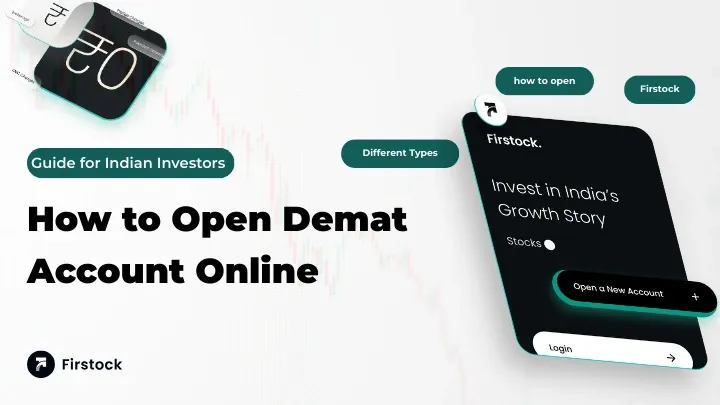Types of Demat Account | Firstock
Introduction
Have you ever wondered how people invest in stocks today without dealing with bulky paperwork and physical share certificates? The answer lies in the Demat account. Think of it as a digital locker where all your shares and securities are stored safely in electronic form. Whether you are a beginner curious about the stock market or someone ready to make your first investment, understanding the types of demat account is the first step.
In this guide, we’ll walk you through everything—from what is demat account, the different types of demat accounts, and step-by-step instructions on how to open demat account in online. By the end, you’ll feel confident about starting your investment journey with platforms like Firstock.
Learn what is demat account, types of demat account, how to open demat account, and how to open demat account in online. Simple guide by Firstock.
What is Demat Account?
A Demat account (short for “Dematerialized account”) is a digital account that holds your shares, bonds, ETFs, and mutual funds in electronic form. Just like your savings account keeps money safe, your Demat account keeps securities safe.
Gone are the days of physical certificates that could get lost, stolen, or damaged. With a Demat account, everything is just a click away.
Why Do You Need a Demat Account?
Imagine carrying all your cash in a wallet instead of keeping it in a bank. Risky, right? That’s how trading without a Demat account feels. Here’s why you need one:
- To buy, sell, and hold shares electronically.
- To eliminate paperwork and manual errors.
- To ensure faster settlement of trades.
- To have secure and transparent investment records.
Benefits of Having a Demat Account
- Convenience – All investments in one place.
- Speed – Instant buying and selling.
- Safety – No fear of losing physical share certificates.
- Accessibility – Manage your account anytime, anywhere.
Types of Demat Account
Now let’s explore the types of Demat account available in India. Choosing the right one depends on whether you are a resident, non-resident, beginner, or corporate investor.
Regular Demat Account
- Designed for Indian residents.
- Suitable for those who invest in shares and securities regularly.
- Easy to link with a trading account for smooth transactions.
Repatriable Demat Account
- Exclusively for Non-Resident Indians (NRIs).
- Funds can be transferred abroad, but only when linked with an NRE (Non-Resident External) account.
- Best for NRIs who want to invest in India and repatriate profits.
Non-Repatriable Demat Account
- Also for NRIs, but unlike repatriable accounts, funds cannot be transferred abroad.
- Must be linked with an NRO (Non-Resident Ordinary) account.
- Ideal for NRIs who plan to keep their earnings in India.
Basic Services Demat Account (BSDA)
- A budget-friendly option for small investors.
- If your holdings are less than ₹50,000, maintenance charges are almost nil.
- Designed to encourage beginners to enter the stock market.
Joint Demat Account
- Can be opened by two or more people.
- Similar to a joint savings account.
- Useful for family members investing together.
Corporate Demat Account
- For businesses and companies.
- Allows organizations to manage investments under the company’s name.
- Helps streamline accounting and tax benefits for corporates.
Comparison of Different Types of Demat Accounts
| Account Type | Who Can Open | Key Feature |
| Regular | Resident Indians | Standard Demat for everyday use |
| Repatriable | NRIs | Funds transferable abroad |
| Non-Repatriable | NRIs | Funds stay in India |
| BSDA | Small investors | Low/no maintenance |
| Joint | Multiple holders | Shared ownership |
| Corporate | Businesses | For companies’ investments |
How to Open Demat Account
Opening a Demat account is simple. Here’s a step-by-step guide:
- Choose a Depository Participant (DP): This can be a broker like Firstock.
- Fill the Application Form: Online or offline.
- Submit Documents: PAN, Aadhaar, proof of address, bank statement, and photographs.
- In-Person Verification (IPV): Some brokers conduct quick video verification.
- Get Account Details: Once approved, you’ll receive your Demat account number.
How to Open Demat Account in Online with Firstock
Opening a Demat account with Firstock is as easy as booking a cab online:
- Visit the Firstock website.
- Click on “Open Demat Account”.
- Fill in your basic details.
- Upload scanned documents (PAN, Aadhaar, etc.).
- Complete e-sign using Aadhaar OTP.
- Verification will be done online.
- Your account will be activated within 24–48 hours.
Documents Required for Opening a Demat Account
- PAN Card (mandatory)
- Aadhaar Card (for address proof)
- Bank statement/passbook
- Passport-size photographs
- Income proof (for trading in derivatives)
Common Mistakes to Avoid When Opening a Demat Account
- Providing incorrect or mismatched documents.
- Not linking your bank account properly.
- Ignoring account charges and hidden fees.
- Choosing a DP without checking their reliability.
Tips for Choosing the Right Demat Account
- Look for zero or low brokerage plans.
- Check annual maintenance charges (AMC).
- Prefer brokers like Firstock that offer advanced trading platforms.
- Ensure good customer support.
Conclusion
A Demat account is your entry ticket to the stock market. From Regular and BSDA to Corporate and NRI accounts, the types of Demat account serve different needs. Whether you are opening your first account or switching to a better broker, knowing your options makes the journey smoother.
And if you’re ready to start today, learning how to open demat account in online with Firstock is the smartest move toward building wealth.
FAQs
- What is demat account and why is it important?
A Demat account is a digital account that stores shares and securities electronically. It makes investing safer, faster, and more convenient. - How to open demat account in online quickly?
Visit a broker’s website like Firstock, fill the form, upload documents, complete Aadhaar OTP verification, and your account is ready in 1–2 days. - What are the different types of demat account in India?
There are six main types: Regular, Repatriable, Non-Repatriable, BSDA, Joint, and Corporate Demat accounts. - Can NRIs open a demat account in India?
Yes, NRIs can open either a Repatriable or Non-Repatriable Demat account, depending on whether they want to transfer funds abroad. - What documents are required to open a demat account?
PAN card, Aadhaar card, bank statement, photographs, and income proof (for derivatives) are required.



